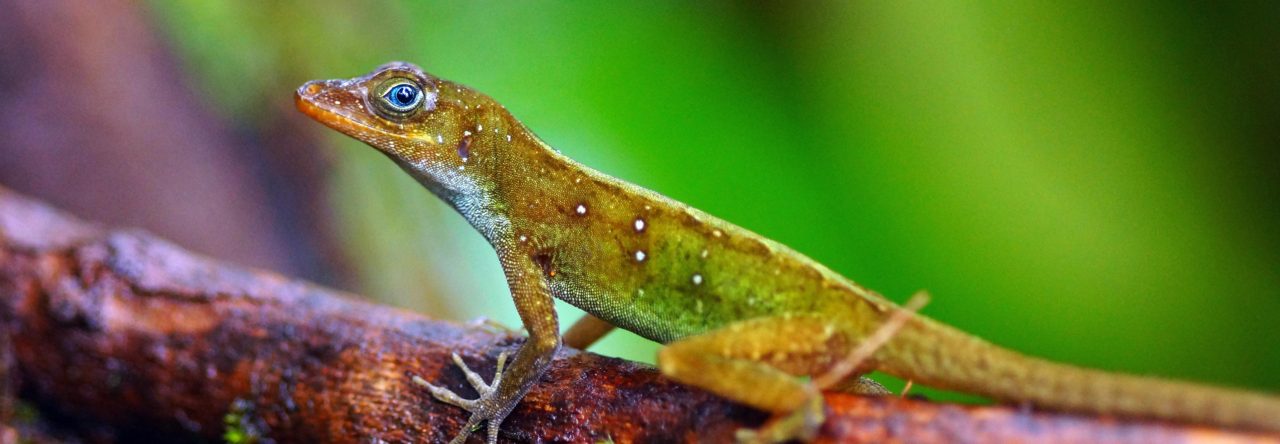Our A. maynardi in Little Cayman seem to be thriving. They have learned when I water the garden & have taken to either dropping out of the trees to lick waterdrops from the bushes or positioning themselves in advance. We also often see maynardi climbing up the outside of the window screen & licking the metal or licking the A/C unit..
Author: Pat Shipman
I'm a semi-retired paleoanthropologist with a particular interest in ecology and past ecosystems. Since I now spend several months a year on Little Cayman, which boasts the rare Anolis maynardi, I have gotten very interested in anoles and conservation. I remain an amateur but as there is so little known about A. maynardi I hope the observations my husband and I make will fill in a few gaps. I am also a science writer and biographer, so if you google me or look me up on amazon, all "those people" are really just me, from the scientific books like THE ANIMAL CONNECTION to FEMME FATALE (a biography of Mata Hari).
Editor’s note: through an editorial lapse, this post has remained unposted for a while. But given the great interest in the recent post on aquatic anoles of Costa Rica (be sure to read the comments), as well as the call for aquatic anole photos, now seems the time!
Some months ago I posted about A. maynardi playing possum in the birdbath after taking offense at my photo-taking and jumping in. Here is another post about this same behavior. A few days later, without any human intervention I found what is probably the very same anole doing the “dead anole float” in the birdbath, eyes closed, limbs limp. While I watched three different species of bird came to drink from the bird bath — a bananaquit, a Northern mockingbird, and a Zenaida dove. They did seem a trifle disconcerted to find an anole in their soup, but none showed any interest in eating it (which I would have expected only from the mocker). We are wondering if, in the height of the dry season, which it was, our anoles are soaking up moisture through their skin. The closest other source of fresh (-ish) water is a murky pond at least 1/4 mile away, which is a long distance for a little lizard.
Two adult male A. maynardi were sitting on a flat tile deck about 6 inches apart with dewlaps exposed and head crests up. There was much head bobbing and they showed their bright yellow dewlaps by turning their heads sideways. Then fast wrestling occurred – It looked like they were using their mouths to bite each other — with the participants separating briefly before repeating the wrestling, during which they turned each other over and over. We (humans) may have precipitated the end of this bout by opening a door to get a camera, but one male ran off the deck down the vertical wall and the other stayed to watch. At this point a small female ran between the two towards the male nearest the deck. After 10 minutes the male that moved off first is sitting on a hand rail and has changed to his dark color, while the other male remains on a step still bright green.
Also: a brief note on nocturnal feeding. We had our first decent rain of the season on the 24th April and on coming home at about 8.30 pm, a large cosmopolitan gecko and a male A. maynardi were sharing the same wall and feeding on insects attracted to the outdoor lights.
My husband and I are retired professors living part-time on Little Cayman, so we have come to know both A. sagrei and A. maynardi fairly well. Due to the dearth of information on the latter, we’re posting whatever we’ve got in hopes it helps someone or inspires someone. We have one, a large male, who sleeps most night on a ledge on the inside of our screen porch (he comes in a gap under the door). He goes to bed about 5:30-6 and wakes up around 8 am.

Anolis who sleeps on top of screen door frame
He is very regular in his habits & quite territorial — we watched him chase a smaller green anolis out of his sleeping ledge with much head bobbing and charges and this morning he smacked into another large male who had the affrontery to be sitting on his deck outside the screen porch! The other male either jumped off the deck or moved quickly to be underneath the deck.
We attach a few photos of two maynardi mating yesterday. Total encounter time was about 6 minutes.

Another view of anole sex
Both maynardi & sagrei drink from our bird bath regularly & follow me when I water the garden to drink off wet decks or leaves.









